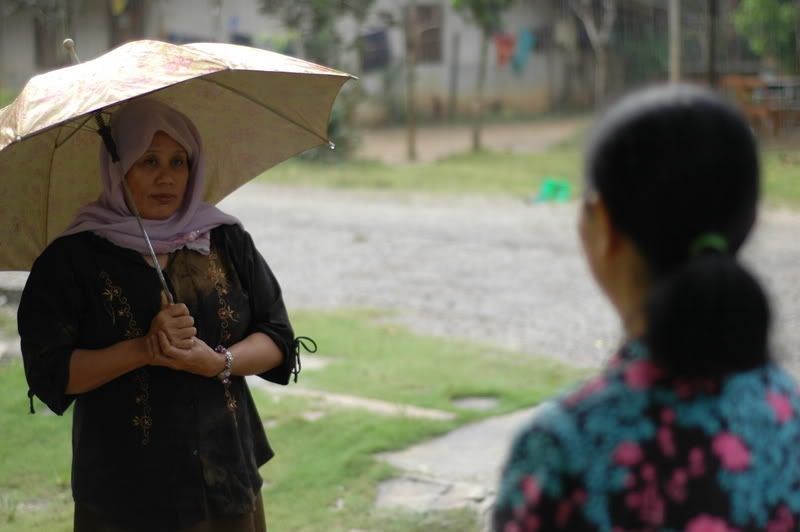Kepada:
Encik Mansor Embong
Setiausaha
Bahagian Kawalan Filem
Unit Penapisan Filem
Kementerian Dalam Negeri
Fax: 03 8889 1685
Daripada:
Amir Muhammad
Da Huang Pictures Sdn Bhd
Rujukan Tuan: 1408160001
26 Febuari 2007.
Tuan,
14 DALIL MENGAPA ‘APA KHABAR ORANG KAMPUNG’ TIDAK LAYAK DIHARAMKAN.Saya merujuk kepada surat pihak tuan bertarikh 12 Febuari. Saya telah membaca 7 sebab untuk pengharaman filem dokumentari saya. Di sini saya ingin membuat rayuan supaya pengharaman tersebut ditarik balik. Dalil-dalil saya ialah:
1. Sebab-sebab pengharaman langsung tidak menyentuh aspek keselamatan negara sebaliknya interpretasi sejarah (dalam hanya beberapa dialog) yang bercanggah dengan versi rasmi. Saya kira hal interprerasi masih tidak merbahaya dan tidak patut menerima pengharaman, memadai dengan amaran atau potongan. Sejarah yang beku ialah sejarah yang sudah mati. Contohnya lihat saja perbezaan interpretasi mengenai Hang Tuah dan Hang Jebat dalam 50 tahun kebelakangan ini.
2. Sebab pengharaman yang terakhir ialah filem ini tidak sesuai untuk ‘masyarakat umum.’ Dengan ini saya meminta slot ‘tayangan terhad’, tertakluk kepada syarat-syarat tertentu. Contohnya filem
The Passion of the Christ. Malaysia dengan bijak menghadkan filem ini kepada penonton Kristian, dan tanpa iklan. Diharap langkah bijak sebegini dapat diambil untuk filem ini juga.
3. Merujuk kepada sebab-sebab pengharaman, jelas terdapat kekeliruan yang amat dasar di antara “apa yang dikatakan oleh filem ini” dengan “apa yang dikatakan oleh sebahagian orang yang diwawancara dalam filem ini.” Dokumentari
Apa Khabar Orang Kampung mengambil sikap yang objektif, tanpa menggunakan suara latar. Ia sekadar merakam satu tempat yang tak pernah dilihat oleh masyarakat tempatan yang lain. Tugas saya sebagai pengarah ialah merakam. Penonton dianggap sudah cukup bijak untuk mendengar apa yang diucapkan tanpa melatah atau mengamok; dan membuat tafsiran sendiri. Samalah seperti dialog filem fiksyen
Puaka Tebing Biru di mana Nasha Aziz berkata ‘Mak tak percaya kat Tuhan ke?’ Ini hanyalah pandangan watak itu dan bukan pandangan filem itu secara keseluruhan.
4. Dokumentari ini patut diberi klasifikasi 18PA untuk unsur politiknya. Apabila warga Malaysia cukup umur 18 tahun, mereka telahpun melalui sistem sekolah rendah dan menengah yang cukup cemerlang dan sudah tahu, malah telah hafal, versi sejarah yang rasmi. Justeru itu, menonton dokumentari
Apa Khabar Orang Kampung tidak akan memudaratkan mereka.
5. Filem ini boleh sahaja dimulakan oleh perkataan yang tertera di skrin, contohnya “
Amaran Oleh Kerajaan Malaysia: Fahaman Komunisme Dilarang Dan Anda Ditegah Daripada Meniru Ideologi Merbahaya Ini!’ Ayat ini boleh terbit dalam saiz font yang amat besar. Ayat ini juga boleh berkelip-kelip seperti lampu neon supaya lebih jelas. Kalau tak cukup satu tanda seru boleh guna lima atau sepuluh.
6. Dokumentari ini mungkin patut diluluskan untuk orang yang telah menonton rancangan yang mendakyah anti-komunis seperti ‘
Jungle Green Khaki Brown.’ Setelah disogok rancangan sebegini (yang menggunakan aksi lasak dan muzik yang menghiburkan), tidak mungkin seorang penonton itu akan terpengaruh oleh dialog orang-orang tua dalam
Apa Khabar Orang Kampung.
7. Dokumentari ini mendapat tayangan perdana dunia di Festival Filem Antarabangsa Berlin, tidak jauh daripada runtuhan Tembok Berlin. Lebih 1,000 orang menontonnya. Biarpun penduduk Berlin pernah mengalami trauma akibat pertembungan Barat dengan komunisme, tidak ada penonton yang protes, pengsan atau mengamok. Kita boleh sahaja anggap Jerman sebagai negara maju, tapi bukankah Malaysia juga bercita-cita untuk menjadi negara maju dalam masa hanya 13 tahun lagi?
8. Pengharaman filem ini tampaknya bercanggah dengan beberapa prinsip yang terkandung dalam Wawasan 2020 yang menjadi pegangan kita, seperti “berjiwa bebas”, “masyarakat demokratik yang matang”, “progresif” serta “masyarakat liberal dan bertolak ansur.”
9. Filem ini besar kemungkinan akan lulus untuk tayangan di Singapura seperti
Lelaki Komunis Terakhir tahun lepas. Tidakkah kita berasa sedikit kaget dan jengkel bahawa rakyat Singapura (yang berkongsi sejarah Darurat dengan kita) sudah dianggap cukup matang sedangkan kita belum?
10. Filem ini boleh juga ditayang kepada mereka yang telah membuat ikrar ‘Akujanji’ sebelum dan usai menontonnya. Ikrar ‘Akujanji’ ini boleh disamakan dengan proses yang harus dilalui oleh mahasiswa, pensyarah dan kakitangan kerajaan. Tapi kali ini mereka harus ‘berjanji’ untuk tidak sekali-kali amalkan fahaman komunisme, biarpun dalam mimpi.
11. Dalam 10 tahun kebelakangan ini, lebih ramai rakyat Malaysia dimangsai keganasan dan kerakusan Mat Rempit berbanding komunis. Namum sudah 3 filem mengenai Mat Rempit dibenarkan untuk tayangan luas di seluruh negara. Tidak adakah sentimen menghormati mangsa mereka?
12. Perang Dingin sudah berakhir pada tahun 1989 dan Malaysia sekarang menjalin hubungan yang amat baik dengan negara-negara China dan Cuba. Jadi kenapakah topik komunisme itu dianggap masih tabu?
13. Malaysia tahun ini meraikan 50 tahun sebagai negara demokrasi. Dalam satu demokrasi, kepelbagaian pendapat patut dibenar malah diraikan. Jika tidak, tidak ada bezanya dengan negara tanpa demokrasi, seperti yang pernah kita lihat di beberapa negara komunis dan teokratik.
14. Puluhan rencana telah ditulis dalam akhbar tempatan apabila
Lelaki Komunis Terakhir diharamkan tahun lalu. Kita boleh saja anggap puluhan rencana ini mewakili satu minoriti yang bersedia untuk menontonnya, dan dokumentari ini juga. Justeru itu tayangan harus dibenarkan untuk minoriti ini. Jika ada yang tidak mahu menonton, mereka ada pilihan untuk tonton filem lain seperti
Remp-It 2 (yang besar kemungkinan akan lulus).
Sekian. Majulah filem untuk negara.
Yang Benar,
AMIR MUHAMMAD
Pengarah
Apa Khabar Orang Kampung

 Spread da word! Apa Khabar Orang Kampung (under its English title Village People Radio Show) will begin screening at Cathay Picturehouse, Singapore, from 10 May.
Spread da word! Apa Khabar Orang Kampung (under its English title Village People Radio Show) will begin screening at Cathay Picturehouse, Singapore, from 10 May.
